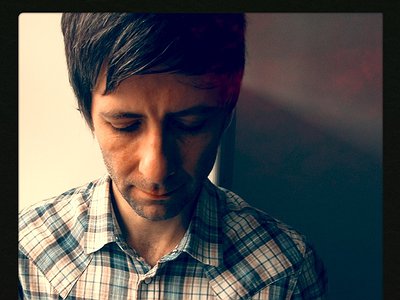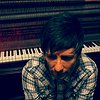Name: John Hanson
Nationality: British
Occupation: musician, teacher
Bands and projects: The Resource Centre/ Magnetophone
Current occupation: Musician, teacher
Current hometown: Birmingham
Labels released on: The Geography Trip/ Earworm/ Static Caravan/ 4AD/ First Fold
Music recommendations: Matt Bower of Wizards Tell Lies / Jon Brooks of The Advisory Circle & Café Kaput
When did you start writing/producing music - and what or who were your early passions and influences?
I remember being very curious about sound manipulation at a young age, before anything theoretical, musically. That came much later. I distinctly remember a triad of tape decks at the foot of my bed: two playing sounds, one recording. Crude multi-tracking. As I got older, the motivation to push a piece of equipment beyond its limitations just got more advantageous. I think a lot of soundtrack music really seeped in to the right side of my brain during the VHS explosion in the late 70s, early 80s. I see a lot of those films we adored in our childhood as silent movies. They relied less on dialogue and more music to direct your emotions throughout the story/narrative, very much like the silent era where a simple piano accompanyment drove the story forward with the use of pitch, tempo, velocity - see Lumiere Brothers, Keaton, Chaplin, Harold Lloyd, etc. The use of a live pianist at live projections was essential to give the audience vital emotional cues - I still see a lot of that in those horror flicks of the 80s.
I fall in and out of love with music all the time. I think that’s quite typical as the process can be all-consuming sometimes. I stepped away from music for a time until I read Daniel Levitin’s book Your Brain on Music. He’s an American cognitive psychologist, neuroscientist and writer. Neuroscience, especially in the field of music and music perception, really clicked with me, possibly because I was being treated for a neurological condition at the time. It really captured my imagination in terms of the artist/listener relationship and I studied music for the first time. It made me a more reflective, conceptual musician. It helped me refine and give a focus to what I do.
What are currently your main compositional- and production-challenges?
Every element added casts a shadow over something else in the mix. I want every component to justify itself and to be crystal clear, so I guess restraint; where, unlike work I’ve engaged with in previous years, the process serves the composition and is not too reliant on inadvertency and chaos. I have strategies. I’m learning – and stealing – from the modern masters and it can be the simplest idea. I’m a magpie for collecting tactics and approaches all the time and I try to deploy them sparingly. The pieces often centre on one idea that dictates what unfolds thereafter. It could be an exercise in pitch, contour, counterpoint, tempo or a single instrument - the simpler the idea the better. The challenge is then to unfold the track and sustain the intrigue without relying on all the colours in the pallet.
What do you usually start with when working on a new piece?
Melody - a melody that sparks the kid in me to get tinkering again. Everything develops from there harmonically. Once I have that, I can apply other elements. But, inspiration can come from left field in any form: a conversation, a single line from a poem, a documentary, a song title. Low Fantasy was heavily influenced by a lot of cycle rides in the countryside I was doing at the time. I never realise this at any given stage in the process, but the work will often mirror my environment at the time – in a subconscious way – by osmosis. Often is the case that I look back on a project only when it’s completed to realise exactly ‘what it is’ – or just before its completion. The same goes for tracks. I came to the realisation that "Slow Release Energy" from Low Fantasy was basically my re-imagining of "Morning Has Broken". It really has a waking quality, it has bird-song – even the title has a reference to a very well known cereal brand. It’s about wheat, and the rising sun and being thankful for a new dawn; I didn’t know this at the time. I really hadn’t connected the dots until someone pointed it out to me. Having no initial intention is something I picked up from Philip Glass. To trust that the work will tell you what it is before you hit your deadline – or just before! Sometimes you just have to trust your instincts. Your brain has always got a plan – it’s way ahead of you – electricity behind your nose doing the work.
How strictly do you separate improvising and composing?
I don’t necessarily see them as different entities, although I tend to compose to lay foundations for improvisation. Working by myself has afforded me the opportunity to develop at my own pace and dig-deeper in to the theory side of music and sound. I see the formal side of music writing/composition as a discipline to hang your creativity on. I’ve learned to be more patient and not rush in to the studio. I used to see it the other way around, but I got tired of shooting in the dark, waiting for something to happen. I like beginning formally to gain a foundation to allow myself to loosen up as the project develops. I only now allow myself in the studio once I have the architectural framework on paper.
How do you see the relationship between sound, space and composition?
Inseparable. The Resource Centre began as a typology project. I began meticulously archiving my students’ musical instruments chromatically to be organised and sequenced into compositions in the studio. It became quite an obsession. I have hundreds of micro samples of a variety of mallet instruments in a variety of locations. For me, composition is an organisation of not only the sound but also the space. I have a library of not only the tonal elements but the ambience of the rooms. That space no longer exists other than in my work. The classrooms no longer exist in the physical world but its potential remains with me - ghosts in the machine. I do lots of field recordings also, and what I’ve enjoyed doing is composing my sounds’ depth of field and figuring out how I can engage the listeners’ perception of what’s in the back, middle and foreground – like theatre stagecraft.
Do you feel it important that an audience is able to deduct the processes and ideas behind a work purely on the basis of the music? If so, how do you make them transparent?
I don’t want to be transparent. I think there will always be an interpretation from the listener that challenges yours. I think this is a healthy process based upon a number of factors completely out of your control. The listener brings a number of experiences to the table that affect the outcome, and interprets a piece of work in a way that can make you see the work from a fresh angle. It’s not about you or the listener – it’s about the work. No ego. Conceptually, the clues are in plain sight, there is a tone, a feel to the music that guides the listener to the intended destination, but surely art is to provoke a sense of wonder, curiosity, ambiguity and objectivity. The processes have the same aim: I want the listener to be drawn in to the work and dig deep. I think it makes for a longer lasting and enriching listening experience.
In how much, do you feel, are creative decisions shaped by cultural differences – and in how much, vice versa, is the perception of sound influenced by cultural differences?
I’m pleased to say, inevitably and indisputably so.



